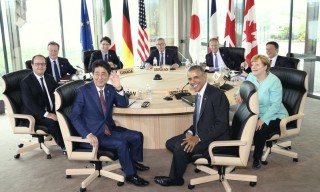Loading
Search
▼ G-7 Leaders Put Focus on Boosting Global Economy
- Category:Other
By Ayako Hirayama / Japan News Staff Writer
ISE, Mie — Leaders of the Group of Seven major countries shared their concerns over the risks stemming from the slowdown in emerging economies as they kicked off their Ise-Shima summit meeting in Shima, Mie Prefecture, on Thursday.
Prime Minister Shinzo Abe, who serves as chairman of the meeting, urged his G-7 counterparts to join hands to take the lead in boosting the global economy. Abe stressed the importance of implementing a combination of measures — monetary policy, structural reform and fiscal stimulus.
At their first session, held over lunch, the participating leaders took up the subject of the world economy, which Abe has called the key theme of this summit.
“We’re facing a big crisis and big risks. And we were able to reach a consensus that the world economy is faced with a great risk,” Abe told reporters after wrapping up the first day of discussions.
The prime minister compared the current situation to the one that existed before the global financial crisis triggered by the collapse of the U.S. investment bank Lehman Brothers, and the G-7 leaders shared the view that the world economy has been at a crossroads, a government source said after the session.
Abe wants to send the world a strong message backed by G-7 unity over policy coordination. Japan has pushed for implementing fiscal stimulus, but the G-7 nations were divided over measures on currencies and fiscal stimulus when G-7 finance ministers and central bank governors met in Sendai last week. Germany and Britain have prioritized fiscal discipline.
However, no opposition was voiced to the importance of fiscal stimulus at this summit.
They did not touch upon the topic of currency fluctuations during the session.
The G-7 countries also underscored the importance of increasing investment in growth areas, such as science and technology, the environment and education, particularly to shore up the middle class, as the leaders are aware that growing frustration has created sluggish sentiment among the middle classes around the world. They also blamed such feelings for the revival of populism and protectionism.
The leaders further exchanged views on China over the excessive supply of steel and other issues. Abe emphasized the need for the G-7 countries to urge Beijing to work closely with them in accordance with international law, and voiced hope of China’s “peaceful” rise.
China unlikely to be named
Discussions continued on the topic of international security, with G-7 leaders sharing concern over the situation in the East and South China seas and recognizing the importance of maintaining order and freedom of navigation based on the principles of international law.
The source says Abe obtained the backing of G-7 leaders for three principles that he previously advocated at the “Shangri-La Dialogue” security summit in Singapore in 2014. These include making claims based on international law; refraining from force when making claims; and seeking to settle disputes by peaceful means.
The leaders referred to China by name during the discussions. However, China, which is not a G-7 member, is unlikely to be named in a communique to be issued at the end of the summit Friday, said the source.
The leaders also participated in an event presenting self-driving vehicles and fuel cell-powered vehicles.
On Thursday morning, before their discussions, the G-7 leaders and presidents of the European Council and the European Commission visited Ise Jingu shrine, thereby marking the opening of the two-day summit. The Ise-Shima gathering is the first G-7 summit to be held in Japan for eight years.
In addition to Japan, the G-7 countries comprise the United States, Britain, Canada, France, Germany and Italy.
- May 27, 2016
- Comment (0)
- Trackback(0)


